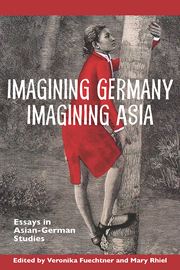Book contents
- Frontmatter
- Contents
- Acknowledgments
- Introduction
- Part I Contemporary Challenges to German Borders and Identities
- Part II Travel and Representation
- 5 Germany's India: A Critical Re-interrogation
- 6 Indians, Jews, and Sex: Magnus Hirschfeld and Indian Sexology
- 7 The Ambivalence of a Spiritual Quest in India: Waldemar Bonsels's Indienfahrt
- 8 Traveling through Imperialism: Representational Crisis and Resolution in Elisabeth von Heyking's and Alfons Paquet's Travel Writing on China
- 9 Measuring Asian-ness: Erwin Baelz's Anthropological Expeditions in Fin-de-Siècle Korea
- Part III Asia Inhabits Germany's Cultural and Intellectual History
- Bibliography
- Notes on the Contributors
- Index
9 - Measuring Asian-ness: Erwin Baelz's Anthropological Expeditions in Fin-de-Siècle Korea
from Part II - Travel and Representation
- Frontmatter
- Contents
- Acknowledgments
- Introduction
- Part I Contemporary Challenges to German Borders and Identities
- Part II Travel and Representation
- 5 Germany's India: A Critical Re-interrogation
- 6 Indians, Jews, and Sex: Magnus Hirschfeld and Indian Sexology
- 7 The Ambivalence of a Spiritual Quest in India: Waldemar Bonsels's Indienfahrt
- 8 Traveling through Imperialism: Representational Crisis and Resolution in Elisabeth von Heyking's and Alfons Paquet's Travel Writing on China
- 9 Measuring Asian-ness: Erwin Baelz's Anthropological Expeditions in Fin-de-Siècle Korea
- Part III Asia Inhabits Germany's Cultural and Intellectual History
- Bibliography
- Notes on the Contributors
- Index
Summary
Introduction: Baelz as an Anthropologist
As a quasi-renaissance man of the late nineteenth century, Erwin Baelz (1849–1913), a German from Bietigheim-Bissingen near Stuttgart, was many things to the cultural and scientific life in Japan, both in the past and in the present. To his numerous students at the University of Tokyo, where he taught for more than a quarter century (1876–1902), Baelz was an energetic professor of internal medicine, pathology, and gynecology, whose medical prowess earned him the title “the founding father of modern medicine in Japan.” To the Japanese imperial household he was an influential court physician whose skillful hands carefully attended Emperor Meiji and his family members. To the residents of Kusatsu, a small spa town north of Tokyo, he was a god-sent benefactor whose research on the medical efficacy of strong acidic spring water turned this bucolic enclave into a renowned international resort. To many practitioners of Japanese martial arts in Japan, Baelz was the modern inventor who single-handedly resuscitated traditional practice and revalidated its physical and emotional benefits. Even in contemporary Japan Baelz is not a total stranger; his name is recalled at least once a year in the form of a prestigious prize—the Baelz Prize—bestowed by Nippon Boehringer Ingelheim, the Japanese branch of the German pharmaceutical giant, since 1964 to promote collaboration between top medical researchers in Japan and Germany.
- Type
- Chapter
- Information
- Imagining Germany Imagining AsiaEssays in Asian-German Studies, pp. 173 - 186Publisher: Boydell & BrewerPrint publication year: 2013



